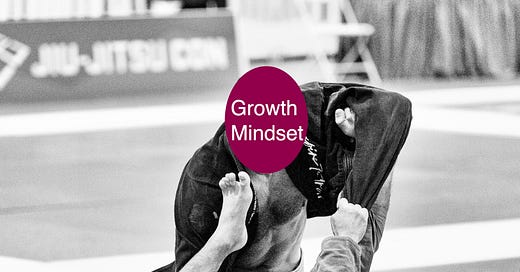If you’re only doing jiu jitsu for fun, just keep showing up, relax during training, and enjoy the ride.
If you want to be a professional, find a pro-level gym with a successful coach and do whatever they tell you.
If you’re starting out as a hobbyist but want to improve as quickly as possible for whatever reason (ie live your anime leveling up dream) these are some tips I have for how to approach jiu jitsu as a committed white/blue belt.
1) Build coordination early
Start working on the most difficult movements early on. For jiu jitsu, I think most of these movements fall within the realm of takedowns and open guard. It takes time to have the strength through range of motion for good double leg, the reflexes and explosiveness for a good sprawl, and the flexibility and core strength necessary to high pommel or invert in guard. These movements are complex and generally unfamiliar, even to dedicated athletes. Ingraining these skills early on will help you five years down the line when you’re trying to put the pieces together.
2) Keep a narrow focus
To become dangerous on the mat quickly, become an expert in a couple specific positions, and then find ways to get there in a match. In particular I think it makes sense to be an expert in guard retention and back control, but you can pick what you like. People that are really good are often talked about in mystical terms, as if they have some secret aura that just makes them Good At Jiu Jitsu. But in my experience, getting good is a matter of slowly building out the number of areas where you feel like an expert in. When you have a path to one of these expert areas from any position, and understand the dilemmas that you can impose on your opponent to get to these positions, it will feel to your opponent that you can read the future.
3) Get good at guard retention and back control
Guard retention, because as my coach says: “when your opponent can’t pass your guard jiu jitsu becomes a lot more fun - there is no getting smashed in side control for five minutes.” Guard retention is a skill that is easily practiced in open rolling, so you can work on it all the time. And having a guard that is impassable will mean you’re able to get reps on whatever you’d like during rolling. Hobbyist gyms often don’t spend enough time doing positional sparring, making it difficult to keep a narrow focus. Retention is a tool that will allow you to easily convert a roll into a focused training session.
Becoming an expert in back control means you always have a way of submitting an opponent, no matter their skill level. This gives you a path to victory even against very skilled opponents. When you have back control in a roll, try to never lose that position.
4) Build your physical resilience
Jiu jitsu is a demanding sport, and if you don’t build strength, flexibility, and endurance into your muscles, tendons, and ligaments, you’re going to be spending a lot of time sitting out on the sidelines not getting reps in.
Crucially, white/blue belt seems to be the time when people get injured the most because they don’t know what they’re doing yet. Everyone says to relax, but I honestly am not sure that’s possible early on in the jiu jitsu journey. Familiarity breeds flow, and when everything is unfamiliar it’s hard not to spazz at least some of the time. So spending serious effort to develop one’s strength and flexibility is critical to surviving those early years without major injuries.
5) The gym is about learning
This should go without saying, but approach time in the gym as time to learn jiu jitsu, not as a competition. This is maybe the most cliche of the tips, but it’s something that needs to be frequently revisited or else lost to the ego. Jiu jitsu is complicated enough as it is, don’t make it harder by having a “killer mindset” and seeing every roll as a war. Everyone I know who trains like this gets stuck at a mid to low level of skill.
Treat most rolls like an experiment: you’re calm, observant, assessing what you do that works and what you need to work on. You’re containing your focus to a single position or concept for a few months, to have the time to study it thoroughly. Maybe 20% of the time, you pick up the pace and work on developing your coordination, speed, cardio, etc. But even then, the back of your mind should be thinking “how can I do this better? What is working and not working for me right now?”
If you’re able to iterate and course-correct on your skillset each day, then you’re getting thousands of cycles of improvement in over the course of white and blue belt. If you’re in the gym fighting wars, weaknesses will stay unpatched and will always be exploited by those with complete games.




